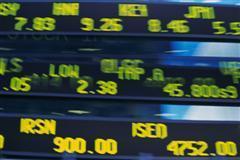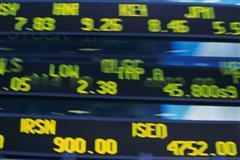| Home | About | Archives | RSS Feed |

@theMarket: The Dog That Wags the Tail
 It is becoming clearer by the day that the U.S. is no longer the Big Dog in financial markets. Ten years ago what happened overseas would have little if any impact on U.S. markets. Today most traders won't make a move without first checking overseas markets.
It is becoming clearer by the day that the U.S. is no longer the Big Dog in financial markets. Ten years ago what happened overseas would have little if any impact on U.S. markets. Today most traders won't make a move without first checking overseas markets.
Last week, I warned that we were in for at least a 5 percent correction and so far we've pulled back 4.4 percent on the S&P 500 Index. I expect continued choppiness through the holiday shortened week with a bias to the downside. There is a possibility that the markets could overshoot and register as much as 6-7 percent drop. I would buy that dip if it occurs.
This correction is a great example of how things have changed. It was countries such as China, Korea and Ireland, not America, which have dictated the turns in our markets.
Over the last two weeks (coinciding with the downturn in U.S. markets), the Chinese government had announced new efforts to slow its nation's growth. China fears that its economy is overheating. Inflation is already running at 10 percent and its citizens are actually hoarding all kinds of stuff from foods to gold to lumps of coal. The real estate market is also out of control and continues to rise each month despite the government's best efforts to slow its ascent. The government has threatened to raise interest rates, tighten monetary policy and take even more draconian methods such as selling commodities on the open market by the shiploads if necessary.
South Korea raised rates twice in two weeks for the same reason. Since April, (when we experienced a serious market pullback) a number of other foreign countries from Australia to Thailand have done the same thing in an effort to reign in their economies.
Markets here have declined in response to these moves because we have now become dependent on these countries for everything from supporting our deficit spending (by buying U.S. Treasury bonds) to the toilet seats in our bathrooms. Many Americans worry that we have traded our economic future for the short-term comforts of cheaper goods, living beyond our means and the "not in my back yard" attitude towards industrial expansion.
"The U.S. is rapidly becoming just another Third World power," laments a 90-year-old retired investor who I make a practice of calling every month or so.
No, he's not a client, but I find his perspective refreshing and his comments pregnant with wisdom and experience. Normally, you don't hear that kind of comment from someone whose family practically built Pittsfield; who was a hero of World War II, and who came home to become one of the county's pillars of industry.
He enumerated all the obvious failings: corrupt politicians, the disappearance of industry, the stratification of classes, our failure to compete educationally and the rampant greed among our captains of industry.
"Take a company I won't name that left this area, shipped off jobs and industry to places like Mexico just to get their share price up," he explained. "It practically wiped out this place, and for what? The price is lower now than when they left."
Hopefully, my friend is proven wrong and this turns out to be just a rough patch that we here in America are going through. I for one have been hoping that the financial crisis of the last two years would be a wake-up call for all of us from the White House on down. So far the jury is out, but Thanksgiving is coming and despite all of our issues, we here in this country have a lot to be thankful for.
 Speaking of which, if you know of any families around the county who might need a helping hand during this holiday season, we here at Berkshire Money Management, 392 Merrill Road, Pittsfield, will be giving away 150 turkeys and $20 gift certificates to Wohrle's Foods beginning Monday, Nov. 22, between noon and 4 (as long a supplies last). It's our way of giving back to a community that makes us feel welcome and wanted.
Speaking of which, if you know of any families around the county who might need a helping hand during this holiday season, we here at Berkshire Money Management, 392 Merrill Road, Pittsfield, will be giving away 150 turkeys and $20 gift certificates to Wohrle's Foods beginning Monday, Nov. 22, between noon and 4 (as long a supplies last). It's our way of giving back to a community that makes us feel welcome and wanted.
Bill Schmick is an independent investor with Berkshire Money Management. (See "About" for more information.) None of the information presented in any of these articles is intended to be and should not be construed as an endorsement of BMM or a solicitation to become a client of BMM. The reader should not assume that any strategies, or specific investments discussed are employed, bought, sold or held by BMM. Direct your inquiries to Bill at 1-888-232-6072 (toll free) or e-mail him at wschmick@fairpoint.net. Visit www.afewdollarsmore.com for more of Bill's insights.
| Tags: correction, inflation, China, overseas markets |
@theMarket: Corrections Are Good for the Soul
 It was long overdue. For weeks, the stock market has registered overbought conditions and still it forged ahead. Investors had driven the averages back to yearly highs and only then did the rally run out of steam. Now it's time to step aside and watch.
It was long overdue. For weeks, the stock market has registered overbought conditions and still it forged ahead. Investors had driven the averages back to yearly highs and only then did the rally run out of steam. Now it's time to step aside and watch.
"Is this the start of something big or should I just stay put?" asked a retired client from Pittsfield who has recouped much of his 2008 loses over the last year.
"Stay put," I said, "because this pullback will be short and unless you are a day trader, too volatile to do more than add to existing positions."
I'm thinking we could see the stock markets drop as much as 5 percent, which from here isn't such a big deal. Take the S&P 500 Index, for example. This week it hit an intraday high of 1,227 (almost 10 points higher than its peak in April). A 5 percent decline from that level would put the average at 1,165, a mere 30 points down from here. That's not worth getting excited about.
As a rule of thumb, I believe that 5 percent to 10 percent corrections in the stock market are the "price of doing business" or the risk one must accept in equity investing. These kinds of corrections occur 2-3 times a year on average. And it is not just equities that are falling.
Commodities are also declining. As I look at the present spot price of gold, the precious metal is off over $40 an ounce while silver is down $1.50 an ounce and oil has plummeted over $3 a barrel — in just one day. Commodities tend to have extremely sharp, if short, corrections that tend to wilt most amateur investors' resolve to stay invested. It appears that once again those who have chased energy, precious metals and agricultural commodities are suffering big reversals this week. Rather than buy this weakness, they tend to sell in panic.
For those with bullish convictions, this pullback is a buying opportunity, not only in commodities but stocks in general. This coming week should provide further opportunities to establish new positions. Some of the areas I favor for additional investment are emerging markets, real estate such as REITs, commodities, commodity companies and selected technology.
As for the culprits that triggered the pullback, most of the negative events have something to do with governments. The on-again-off-again saga of the European debt crisis has reignited fresh worries over Ireland's struggle to rescue its financial system. It has led investors to re-examine Europe's financial situation in general.
At the same time, China is rumored to be hiking interest rates in an attempt to slow their economy. That would spell bad news for everyone since China has become the new locomotive of global growth. Over in Korea, where the G20 adjourned without agreeing on how to curb the growing currency war, left investors worried and disappointed over the fate of the U.S. dollar.
All of the above are serious issues but they have been with us throughout the year. China has raised rates before and emerging market growth is still quite healthy. The problems of Europe's smaller economies will continue to plague the Euro and the European Community for the next few years, but has not stopped their stock markets from enjoying substantial gains over the last six months.
The financial world is fully aware of every nuance of the currency debate. The dollar has declined since late August, sending stocks and commodities ever upward. None of this is new. Consider this pullback a healthy correction and that's all you need to know.
All these reasons for the sell-off will still be with us a month from now when the averages have regained their upward ascent, so don't put too much stock in today's headlines. They are fleeting at best. Focus instead on the opportunities this sell-off will present.
Bill Schmick is an independent investor with Berkshire Money Management. (See "About" for more information.) None of the information presented in any of these articles is intended to be and should not be construed as an endorsement of BMM or a solicitation to become a client of BMM. The reader should not assume that any strategies, or specific investments discussed are employed, bought, sold or held by BMM. Direct your inquiries to Bill at 1-888-232-6072 (toll free) or e-mail him at wschmick@fairpoint.net. Visit www.afewdollarsmore.com for more of Bill's insights.
| Tags: corrections, stocks, metals, China, commodities |
@theMarket: Markets Are Going Higher
|
Fed Chairman Ben Bernanke's putting his faith in the market. |
The above headline may be a bold statement, especially when the averages are already at levels that surpass this year's stock-market highs. But the actions and words of the Federal Reserve Bank this week convinces me that stocks have substantial upside ahead of them.
As I predicted, this week was a big one for investors and the country. The mid-term election results and the resulting legislative gridlock in Washington most pundits expect leaves the Fed as our only hope in reviving the economy and reducing unemployment. (see yesterday's column "Don't Fight the Fed.")
The $600 billion in additional quantitative easing (QE II) and Chairman Ben Bernanke's Op-Ed piece in the Washington Post makes obvious that not only is the Fed targeting stronger growth in the economy but also higher prices in the stock market.
It is the first time in my career that a Fed chairman has explicitly targeted stocks as a tool to increase consumer spending, grow the economy and reduce unemployment.
Imagine my surprise when a day later, the central bank of Japan stated the very same thing but went a step further by also targeting real estate prices in its country.
This takes government support of the economy to an entirely new level in my opinion. During the financial crisis and its aftermath, the government (the Fed, U.S. Treasury and both the Bush and Obama administrations) has on several occasions provided a back stop to the markets. They took actions to save corporations, provided support for declining securities such as mortgage-backed securities, even money markets, and promised to support or bail out the U.S. financial markets with all the power at their disposal. It was one of the main reasons back in early 2009 that I turned bullish on the stock markets. I was betting on the government because they have much deeper pockets then the private sector and if they failed to fulfill their promise we were all doomed anyway.
This week's comments from Bernanke have taken that implicit promise of "support" a big step further. If I read this right, Bernanke is saying that consumers and corporations are still worried about the economy and their own finances. Higher stocks, according to Bernanke, will restore confidence as Americans see their savings rebound. That confidence could lead to additional spending, which would mean more growth in the economy and ultimately lower unemployment. Therefore, insuring that stock prices go higher would accomplish the Fed's mandate of lower unemployment.
Now that does not mean the Fed is simply going to jack up the market in one big melt-up. There will still be corrections. The market is overdue for one right now but over the longer term, at least the next few quarters, I think the fix is in. So if you have been sitting in Treasury bonds or cash waiting for the inevitable second collapse in stocks you may have to wait several more years. In the meantime, you could miss out on a substantial rally in equities.
I also think that we will finally see a dip in the unemployment rate over the next few months. The stimulus money that was spent during the run-up to the elections has generated additional jobs and those jobs are beginning to show up in the data. In addition, I expect U.S. productivity will begin to falter as the economy perks up. So from where I sit, the next few quarters look pretty good for the stock market.
Bill Schmick is an independent investor with Berkshire Money Management. (See "About" for more information.) None of the information presented in any of these articles is intended to be and should not be construed as an endorsement of BMM or a solicitation to become a client of BMM. The reader should not assume that any strategies, or specific investments discussed are employed, bought, sold or held by BMM. Direct your inquiries to Bill at 1-888-232-6072 (toll free) or e-mail him at wschmick@fairpoint.net. Visit www.afewdollarsmore.com for more of Bill's insights.
| Tags: Bernanke, Federal Reserve, stock market |
@theMarket: Marking Time
This coming week will be a humdinger for the markets. The Federal Reserve is expected to begin a second round of quantitative easing and voters will deliver their verdict on the economy in mid-term elections. Both events will have ramifications for investors and stock markets worldwide.
The Fed's decision to further stimulate the economy via a second round of quantitative easing (QE II) has already been priced into the market, in my opinion, but the impact of the mid-term elections has not. If the Republicans gain a majority in the House and additional seats in the Senate, as many political pundits predict, then the markets have reason to rally in the months, if not weeks ahead.
For me, the question is when, not if, the markets will gain more ground. Stocks (and some commodities) are somewhat overbought right now and looking for an excuse to pull back. Maybe the election results will precipitate a "sell-on-the-news" reaction in the very short term. The question I ask is whether the lame-duck Congress will give investors an added excuse to sell?
Most readers are aware that the Bush tax cuts are scheduled to expire in 2010. Will Congress act to extend those cuts before the end of the year? If it does (by extending the tax cuts for many, if not all, Americans), then the markets could see substantial gains. On the other hand, if nothing is done and the tax cuts are allowed to expire than we may be in for a period of uncertainty.
Since I have been attending Charles Schwab's yearly investor conference in Boston this week, it was a good opportunity to take the pulse of the best and brightest on Wall Street as they shared their views of the market and economy. Clearly, just about everyone I talked to is bullish. Not once did I hear the term "double-dip recession," and for the most part, just about everyone was looking for strong markets between now and at least the second quarter of 2011.
In addition, no one likes bonds, especially U.S. Treasury bonds. "Bubble" was the term most often used when describing the $70 trillion investors have stashed away in the bond market. Most argue that the perceived safety that investors see in bonds is an illusion. The investment team from Gameco Investors Inc. headed by famed value investor Mario Gabelli argued that bonds are "in the ninth inning of a 30-year run" providing holders with little yield, no growth prospects and a mountain of interest rate risk. In addition, "Money markets are also not as safe as you think," said Gabelli.
He points out that the $2.8 trillion in money-market funds has a great deal of dollar risk in the form of depreciation, inflation and debasement, besides offering little in the way of yield or growth.
Currency wars was also a leading topic of discussion with most participants believing the battle between nations to keep their currencies weak will continue. The prognosis for the greenback is more weakness ahead as America attempts to export its way to greater growth. As a result, U.S. companies that export are in vogue, especially technology stocks.
Gold, precious metals and commodities in general was an area of heated arguments, with some dismissing the recent run ups as irresponsible speculation while others read the price moves as a rationale answer to declining currencies and the inevitable rise in inflation that lurks just around the corner.
Emerging markets are once again in favor as an area for long-term investment. Bulls point to the increasing percentage of global GDP (49 percent) represented by these fast-growing economies as opposed to what they consider is an underrepresented share of the world's stock market capitalization (only 31 percent).
In the minus column, financial stocks stood out as an area that won't regain its pre-2008 luster anytime soon, neither will consumer discretionary stocks. In both cases, these sectors suffer from the deleveraging that is under way among American consumers. Banks, whose major business is making loans to customers, will experience low growth since Americans are trying to reduce, not increase, their debt as a percentage of their personal income. Consumers are reducing that debt by cutting back on their discretionary spending.
All in all the tone was upbeat at the conference and it felt that business was beginning to get back to normal after several years of strife. Whether that is a good thing when discussing the financial services sector is a matter of opinion.
Bill Schmick is an independent investor with Berkshire Money Management. (See "About" for more information.) None of the information presented in any of these articles is intended to be and should not be construed as an endorsement of BMM or a solicitation to become a client of BMM. The reader should not assume that any strategies, or specific investments discussed are employed, bought, sold or held by BMM. Direct your inquiries to Bill at 1-888-232-6072 (toll free) or e-mail him at wschmick@fairpoint.net. Visit www.afewdollarsmore.com for more of Bill's insights.
| Tags: recession, currency, bonds, forecast |
@theMarket: Third-Quarter Earnings Reveal Two Economies
 With one quarter of the companies in the S&P 500 already reporting, third quarter earnings have been a positive surprise. Eighty-six percent have exceeded earnings estimates and 67 percent have posted higher revenue numbers. What the numbers don't say is that most of those gains have come from overseas.
With one quarter of the companies in the S&P 500 already reporting, third quarter earnings have been a positive surprise. Eighty-six percent have exceeded earnings estimates and 67 percent have posted higher revenue numbers. What the numbers don't say is that most of those gains have come from overseas.
The revenue number is where we should focus our attention. Higher earnings can be achieved by simply continuing to cut costs (by firing workers, for example). However, looking at the revenue numbers gives us a clear understanding of where the growth is coming from. Not much of it is coming from the home front. A lot of that growth is coming from higher sales in Asia and other emerging markets.
Since the bottom of the recent recession here in America, the majority of firms in the S&P 500 have been exporting their way into profitability. This quarter was no different. Take United Parcel Services; it is one of the companies that investors consider a good barometer of the global economy because it delivers products everywhere. UPS showed a 3.5 percent increase in growth versus last year here at home while their international growth was 13.7 percent. Many other companies are experiencing the same phenomenon.
Clearly, the falling dollar has helped exports as has the increasing strength in emerging market economies, particularly in Asia. And this weekend all eyes will be focused on the latest round of G20 talks in Seoul, where the ongoing battle to "beggar they neighbor" will continue. We can expect currencies to be one of the main topics of conversation since our own U.S. Treasury Secretary Tim Geithner has already fired the first broadside. In an open letter he has asked members to "refrain from exchange rate policies designed to achieve competitive advantage by either weakening their currency or preventing appreciation of undervalued currency."
In last week's column, "The Coming Currency War," I explained how the world's governments are using their currencies to increase exports at the expense of their neighbors. Clearly, U.S. third-quarter earnings underscore how our own policies have aided and abetted U.S. companies in exporting more. This makes Secretary Geithner's request look a bit suspect in my opinion. It will be interesting to see the response of other governments.
I mentioned last week that I was waiting for commodities, specifically gold and silver, to pull back. I expected that pullback to be sharp, and it has been. After hitting a high of $1,380 an ounce, gold dropped as low as $1,317 an ounce in what felt like a blink of the eye. Silver also had a commensurate move downward. As expected, a rise in the dollar was the catalyst for that pullback. Traders will wait until they see the results of this weekend's G20 meet before going back into precious metals or other commodities.
There is always the risk that some new policy initiative could strengthen the dollar and thus continue the commodity sell-off. It could happen, but I wouldn't hold my breath. There are few new policy alternatives on the table in Washington to revive the economy so my bet is that after a brief period of strength, the dollar will resume its decline, gold and other commodities will continue higher and so will the stock market. Under that scenario, we are back to buying the dips. Invest accordingly.
| Tags: currency, global economy, dollar |


